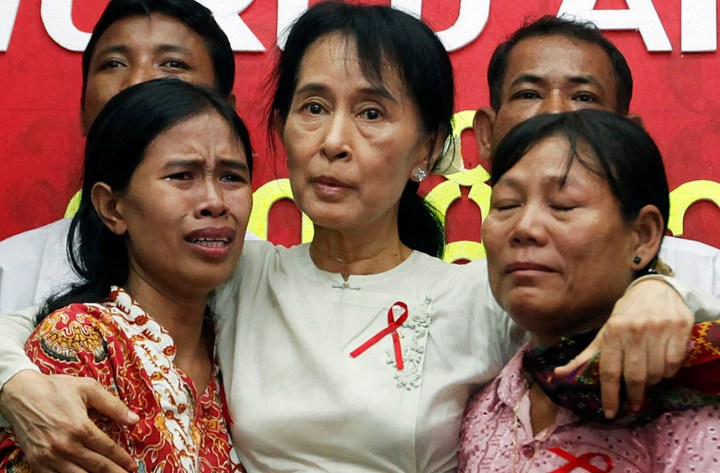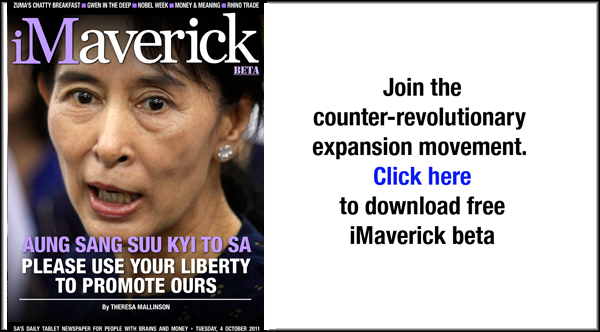Politics
Aung San Suu Kyi to SA: “Please use your liberty to promote ours”

It was something special to be present at the Skype link-up with Burmese pro-democracy activist Aung San Suu Kyi on Monday afternoon. And in-between all the mutual flattery of South African struggle activists and Burmese activists congratulating each other on fighting – and continuing to fight – the good fight, there was a definite message: our government's foreign policy should take a more proactive stance in condemning human-rights abuses around the world, and Burma in particular. Dirco, are you listening? By THERESA MALLINSON.
On Tuesday Burma’s Nobel peace prize laureate, Aung San Suu Kyi will receive an honorary doctorate in literature and philosophy from the University of Johannesburg. She will not be attending the ceremony; although she was freed in November 2010 – conveniently just after the elections, and after having spent 15 of the past 21 years under house arrest – Suu Kyi has yet to travel outside the country. If she risked it, she’s not certain she’d be allowed back in again.
On Monday a small group of academics, activists and journalists gathered in the UJ humanities common room to hear Suu Kyi speak via a Skype link-up. (It was mostly hearing, owing to technical imperfections, although we did get to see her at the beginning and the end of the talk – as someone quipped: “maybe the generals are interfering with our video link”.)
Most of Suu Kyi’s talk was in the form of a question-and-answer session. What emerged most strongly, both in her talk and a video message from journalist Win Tin – a winner of the Unesco press freedom award – was the way in which pro-democracy activists in Burma see South Africa as a moral compass, notwithstanding the fact that our post-apartheid foreign policy hasn’t always matched up to the ideal of promoting human rights. “There was a time when you could say that the situation in South Africa was far worse than it was in Burma, but not any more; you have achieved so much,” said Suu Kyi.
Burma has been ruled by a military junta since 1962. Although elections were held in 2010, their freeness and fairness is another question. The Union Solidarity and Democratic Party walked away with 78% of the vote, with Suu Kyi’s party, the National League for Democracy boycotting the elections. And Kiru Naidoo, who founded the South African branch of the Free Burma Campaign, pointed out that the battle for democracy in Burma is far from won. “The theme of fear dominates the discourse on Burma. This is in spite of fairly significant recent developments which to the casual observer hint that the country may be in transition from authoritarian rule to some form of democratic alternative,” he said.
Graham Bailey of the Free Burma Campaign in South Africa referenced a “campaign to pretend things are changing for the better in Burma”, but stated that the military were breaking ceasefire agreements in the north – “killing civilians, raping women, and driving villagers into the jungle”. This led him to ask: “Does this suggest that Burma is sliding into civil war?”
“I think we should all be concerned about the possibility of hostilities breaking out all over the country. Some of the ceasefire groups seem to be negotiating with the authorities, but others are not at that point,” responded Suu Kyi. “It’s very natural that people should view recent developments with sceptism. It’s a while until we can say we are well on the road to genuine democratisation, but everyone deserves the benefit of the doubt. We’ve got to work hard to make the most of this opportunity to achieve unity and peace for our people. It will not be easy, it has never been achieved before. Burma is a country of many ethnic groups.
“We do intend to get to that position where we are a true union of minds and hearts. It’s going to be tough,” Suu Kyi said, and exhorted the world to keep their eyes on the situation and encourage – and criticise – when it is due. “South Africa could help by sharing their experiences,” she said. “You also had to overcome a lot of strife to get to the point where you can say you’re a free and united country.”
When Suu Ki was asked the question on everyone’s minds, that is our government’s commitment to human rights in the light of the impending Protection of State Information bill, the proposed media tribunal, and, most especially, the shameful the dilly-dallying over the Dalai Lama’s visa (and that’s a kind way of putting it), she came across as diplomatic, but candid. “Sometimes we get the feeling perhaps that South Africa, or rather I must be frank and say perhaps South African authorities, do not support the struggle for democracy and human rights as enthusiastically as, for example, individuals like Archbishop Desmond Tutu,” she said. “It would be so good if those who have successfully overcome their problems would remember those who were still struggling to overcome theirs.”
Naidoo pointed out that in 1952, Burma was one of 13 countries that requested that “the question of race conflict in South Africa resulting from the policies of apartheid of the government of the Union of South Africa” be placed on the agenda of the UN General Assembly. Fast-forward more than half-a-century later to 2007, and South Africa didn’t return the favour. We were one of three countries (the others being Russia and China), to vote against a resolution at the UN Security Council to deplore human-rights abuses in Burma.
Tutu has previously called this vote “a betrayal of our own nobel past”. And Thein Win, the chairman of the Free Burma Campaign in South Africa, was working on the Thai-Burmese border at the time South Africa rejected the resolution. “South African moral values impact all over the world,” Win said. “At the Thai-Burma border more than 100,000 exiles, political immigrants, teachers and students are there. They know Mandela and South Africa, and because of Mandela they know about South Africa. I was really, really embarrassed. The news comes out that South Africa was against the resolutions, and then immigrants and workers they ask me: ‘Dr Thein Win, you are from South Africa, what happened?’. I don’t know how I can answer for that,” he said, visibly displaying emotion.
South African currently maintains full diplomatic relations with Burma. Their government has an embassy in Pretoria, and our mission in Thailand is accredited to Burma. “The South African head of mission in Thailand… has twice met Aung San Suu Kyi since her release from detention,” said Naidoo. “(But) save for diplomatic niceties, the South African government has been unwilling or unable to show Aung San Suu Kyi or the Burmese democracy movement any tangible support.”
Both Suu Kyi and, in particular, Win Tin implored South African activists to put pressure on our government to help “solve Burma’s human-rights problems”. Tin said: “You should try to push your government so that they will be much more of a champion of human-rights matters – not only in Africa, but also in Burma.”
This cry echoed the famous title of Suu Kyi’s 1997 book: “Please use your liberty to promote ours”. But at the same time, Burmese activists are not sitting around waiting for others to take action. “We are not optimistic because we’re depending on other things; we’re optimistic because we’re depending on our own commitment,” said Suu Kyi. “We are cautiously optimistic. We only hope for as much as we can do; we don’t hope just sitting there doing nothing. There’s a very popular song in Burmese: ‘sitting is not going to get you anywhere’. So we’re not going to sit, we’re going to move to get to where we want to.”
And one day, she would like to visit South Africa. “We would very much like South Africa to go from strength to strength and carry on being a beacon of hope for the world. I would very much like to come to South Africa and see for myself what is going on there,” Suu Kyi said. We hope that this is possible in the not-too-distant future. And that Suu Kyi can get a visa. DM
Read more:
- Aung San Suu Kyi worried about violence in Myanmar, in the Guardian, via the AP;
- South Africa drags feet in democracy struggle: Suu Kyi, on AFP.
Photo: REUTERS




 Become an Insider
Become an Insider